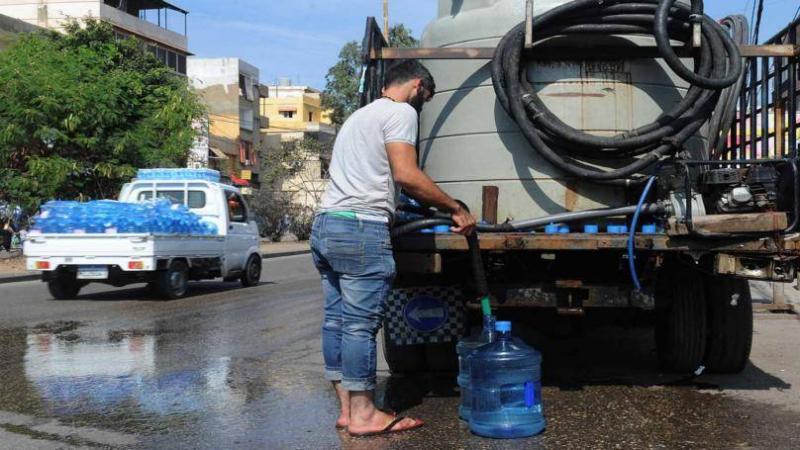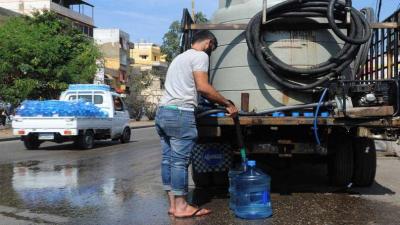The water crisis that Lebanon experienced, with new chapters unfolding in 2022, is a natural extension of the ongoing decline. Notably, the tangible repercussions from last year revealed the negative trajectory the country is on. The spread of cholera at high rates and water outages across all regions did not prevent the continuation of questionable projects, indicating that the water crisis is still developing, whether in rivers, drinking water, or the sea.
#### Diesel and Water Trucks
The near-total interruption of electricity prevented the operation of pumping generators in central wells in villages and cities. The fuel crisis manifested in the dollarization of diesel prices, further complicating the delivery of water by private trucks amid increased demand from residents. The price of a diesel canister ranged between $20 and $25, and with water outages reaching between 70% to 100%, the cost of water transported by trucks soared, costing around 400,000 LBP per truck, leading to monthly bills of no less than 1,600,000 LBP for each household.
Municipalities attempted to rely on solar energy to operate central pumping generators, but they faced funding issues, as the costs of installing solar panels and their requirements were prohibitively high. Some municipalities depended on donations from expatriates, NGOs, and international organizations, as well as aid provided by UNIFIL in southern villages. Nonetheless, the crisis was not resolved definitively.
#### The Water Crisis in Beirut
The failure of the main pumping line that supplies Beirut highlighted the deteriorating condition of the water distribution network in Lebanon. Repair efforts for the line extending from the Dhour area to the capital, known as Line 1200, fell victim to insufficient dollar availability. Contractors demanded payment in cash dollars, which forced the Beirut and Mount Lebanon Water Authority to employ a less efficient engineer, increasing the number of malfunctions on the line and delaying the water supply to the capital. Funding from UNICEF could not completely save the line; during testing after fixing several issues, leaks appeared elsewhere due to the dilapidated network established over 50 years ago.
#### Cholera and Qaraoun Fish
The cholera outbreak reminded people of the pollution of water from north to south, passing through the Bekaa region from which the Litani River flows, the most polluted river in Lebanon, affecting many villages until it reaches its mouth in southern Lebanon and feeding Lake Qaraoun, where pollution levels are increasing, resulting in a disaster characterized by the fishing and collection of dead fish for sale in markets. Hundreds of millions of dollars have been spent by international entities to clean riverbeds, specifically the Litani River, including funds designated for cleaning Lake Qaraoun, which disappeared without completing the task. The result was rampant cholera and over 10,000 tons of contaminated fish.
#### The Talasa Spring Project
Under the guise of solving the water crisis, the Talasa Spring project appeared in the Etiffah region, funded by UNICEF and officially covered by the Southern Lebanon Water Authority. The project ostensibly aims to "utilize excess rainwater and deliver it to towns suffering from water shortages" but quickly revealed indicators of corruption and deals, not limited to the exploitation of winter water excess. The project did not receive the necessary official approvals, particularly an environmental impact study to protect the spring's environmental surroundings.
After local residents objected to the project, the contracted company hastened its work pace and fabricated a conflict with the residents. A decision by the urgent matters judge in Nabatieh, Ahmad Mazhar, to "immediately halt all work related to the Talasa Spring project" did not stop their operations. The company, along with the water authority, continued legal procedures without managing to improve the project's image. Consequently, the National Litani River Authority sent a letter to UNICEF demanding the "halt of project funding and conduct an internal and public investigation into how the project was approved and determine responsibilities for violations of Lebanese laws and environmental and water regulations, causing disputes among residents and waste of environmental resources in southern Lebanon."
#### Sea Water Issues
Increased levels of bacterial pollution, primarily due to untreated wastewater leaking into the sea, exacerbated by landfill leachate, have created unsafe zones for swimming and fishing along the shore. Throughout 2022, laboratory tests conducted by the National Center for Oceanography, part of the National Council for Scientific Research, revealed 24 good to very good swimming sites out of 37 reference points used for bacterial testing in the water. The results indicated 7 locations that were polluted to varying degrees with high levels of fecal bacteria, exceeding allowable limits, alongside 6 sites deemed risky to critical and unsafe.
#### Additional Plans
In a theoretical attempt to rescue the situation, Minister of Energy and Water Walid Fayyad proposed three plans "to improve performance in the water sector," focusing on "the necessity of providing us with diesel, using solar energy, or extending service lines from the Electricite du Liban to water pumping stations and the sector's basic assets." All plans shared the need to "increase the subscription and collection process and improve network performance so that we have financial sustainability for the sector." In Cairo, Fayyad carried the water crisis, calling during a conference titled "Water at the Heart of Climate Work" for gathering efforts to implement projects via public-private partnerships, funded by "governments and funding entities."
#### Negative Summary
Sources in the water sector contextualize what Lebanon witnessed last year as "continuation of a persistent trend. What happened over the past year is not disconnected from previous years, leading to the expenditure of millions of dollars without results." The difficulty, as the sources tell "Al-Modon," is "the destruction of water institutions so that they do not perform their correct work, eliminating the need for the sprouting of side projects such as the Talasa Spring project and earlier dam projects." Meanwhile, reform attempts and proposals from official parties have been "delayed significantly and deliberately. UNICEF warned in 2021 of a dangerous water crisis that Lebanon would face in 2022, and official entities did nothing."




